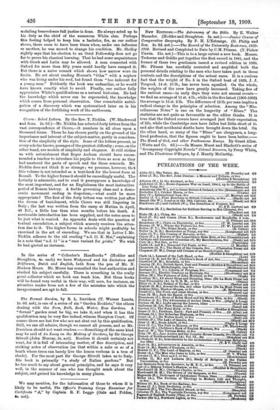Cicero : Select Letters. By the Rev. T. Nicklin. (W.
Blackwood and Sons. 2s. 6d.)—Mr. Nicklin has selected forty letters from the vast correspondence of Cicero,—it numbers in all close upon a thousand items. These he has chosen partly on the ground of the importance and interest of the subject-matter, partly in considera- tion of the simplicity of the style. Some of the letters present, as every scholar knows, passages of the greatest difficulty ; some, on the other hand, are models of simplicity and elegance. It still strikes us with astonishment that Roger Ascham should have recom- mended a teacher to introduce his pupils to them as soon as they had mastered the parts of speech and the three concords. Mr. Nicklin does not think it so strange ; we presume, however, thrt this volume is not intended as a text-book for the lowest form at Rossall. To the higher forms it should be exceedingly useful. The Latinity is admirable, and to read it presupposes a knowledge of the most important, and for an Englishman the most instructive period of Roman history. A feeble governing class and a demo- cratic movement ending in despotism,—what could be more appropriate ? The first of the forty letters was written just after the decree of banishment, while Cicero was still lingering in Italy ; tho last was written from the camp at Mutina in April, 43 B.C., a little loss than nine months before his death. A serviceable introduction has been supplied, and the notes seem to be just what iS wanted. An appendix deals with the question of textual emendation, a subject which scarcely receives the atten- tion due to it. The higher forms in schools might profitably be exercised in the art of emending. We see that in Letter I. Mr. Nicklin adheres to the old reading " a.d. 11. K. Mai," explaining in a note that " a.d. 11 " is a "race variant for pridie." We wish he had quoted an instance.










































 Previous page
Previous page